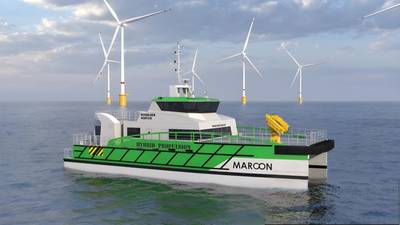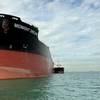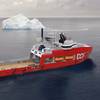Korean Firm Certifies Its Hybrid Offshore Wind CTV Design
Korean maritime service company MARCON has secured an approval in principle (AiP) from Korean Register (KR) for its crew transfer vessel (CTV), a passenger and cargo transport vessel dedicated to offshore wind farms.
The CTV that received the AiP adopts an eco-friendly hybrid electric propulsion system using batteries.
This addresses environmental regulatory issues while also offering fuel cost savings and supporting safer offshore wind farm operations.
The key components of the CTV include a hybrid system and energy storage system (ESS) provided by Hanwha Aerospace, Linear Jet propulsion units and hybrid CTV power conversion devices, integrated PEMS (Power & Energy Management System), and generators supplied by YusinHR.
According to MARCON, the electric hybrid CTV is expected to reduce operating time by about 34% and decrease carbon dioxide emissions by approximately 70% compared to traditional internal combustion engine propulsion systems.
The construction of the vessel began at a Korean shipyard in September 2024, with its launch scheduled for 2025.
"It is very meaningful to be part of the first application of an eco-friendly hybrid electric propulsion system for a CTV, and we will continue to provide technical support throughout the vessel’s construction and future launch,” said Kim Daeheon, Executive Vice President of KR’s R&D Division.













